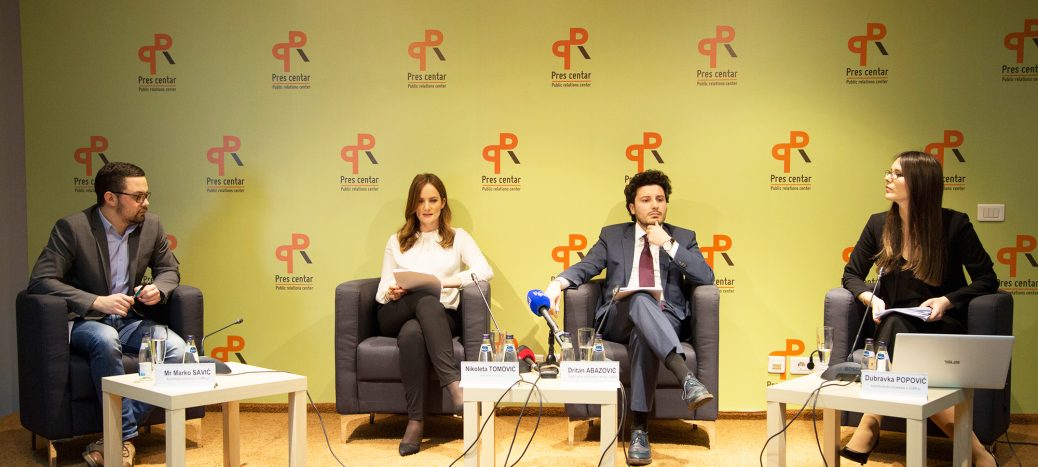In Montenegro, the position of the president of political parties is characterized by significant concentration of powers, very strong authorities and possibilities of acting that they draw from provisions in the Statute, but often from informal sources of power – it was announced on Centre for Monitoring and Research’s panel.
That nongovernmental organization presented findings of the research about presidentialization of political parties in Montenegro, in which it analyzed the issue of centralization of leadership and authorities of the president of Democratic Party of Socialists (DPS), Social-democratic Party (SDP), Socialist People’s Party (SNP), Bosniak Party (BS), New Serbian Democracy (NOVA) and Movement for Changes (PZP).
Executive director of CeMI, Nikoleta Tomovic, said that it happens in practice that presidents of parties, due to the lack of solutions in the Statute, draw power from informal powers.
“With that we explain the fact that solutions in the Statute determine that the president of the DPS doesn’t have strong authorities, while in practice we have different situation. We determined that milder versions of presidentialism are present in DPS, SDP and SNP, considering that president of SDP has more authorities in the election of members of executive bodies of the party, as well as in the procedures of candidates selection”, Tomovic said in PR Centre.
Unlike those parties, as she stated, Statues of PZP, BS and NOVA don’t provide more authority for their presidents regarding this issue.
“If we analyze authorities of presidents of political parties in the range of election of members of executive bodies, presidents of SDP and SNP have the highest authorities”, Tomovic said.
According to her words, presidents of parties in Montenegro enjoy strong support of the party, especially in parties where officials of the party aren’t elected by representative bodies.
“However, regardless of the jurisdiction and scope of authorities that are delegated to them by the Statute or some other party act, almost all political parties are recognized by their presidents who symbolize the party in some way. It is especially noticeable in parties whose presidents occupy significant political positions in executive and legislative branches of government, both on local and national level”, Tomovic pointed out.
Project coordinator in CeMI, Dubravka Popovic, said, during the presentation of findings of the research of parties that have been established recently, that the impact of the president in case of Democratic Montenegro is medium to high, due to his/her great opportunity to nominate candidates in large number of executive bodies.
“When it comes to DEMOS, the impact of the president is high and in large extent expressed compared to all categories of interparty structures, while the impact of the president in the case of Civil Movement URA is defined as low to medium, since the president has the power to nominate candidates in very few bodies”, Popovic stated.
She said that CeMI’s conclusion is that, in case of new parties, there is a tendency to imitate parties that have expressed power in society and that are dominant in sense of governing for a long period of time.
“We can state that parties in Montenegrin society imitate party system with dominant party”, Popovic pointed out.
Dritan Abazovic from Civil Movement URA said that it is completely unimportant what the Statute of the party says.
“I will say that based on my experience in previous party, it is completely unnecessary thing, whether the Statue of DPS says that the president has these or those authorities. Authority is useless if you don’t have powerful people, if you don’t have people who are autonomous”, Abazovic considers.
He said that there must be autonomous individuals who, as he estimated, may have an impact on higher level of democracy in Montenegro.
Project coordinator in CeMI, Marko Savic, estimated that after the Parliamentary elections, Montenegrin party system is being transformed in polarized pluralism.
After the Parliamentary elections, as he reminded us, the majority was determined by parties with extremely weak support of voters, but with “great blackmailing capacities”.
“It is impossible to predict whether the trend of transformation of the Parliament is going to continue, but we can state that the trend is compatible with the current electoral system in Montenegro – proportional list electoral system with low electoral threshold of 3%, as well as strong affirmative action towards parties that represent national minorities”, Savic argued.
Panel is organized within the project “Balkan Comparative Electoral Study”.
